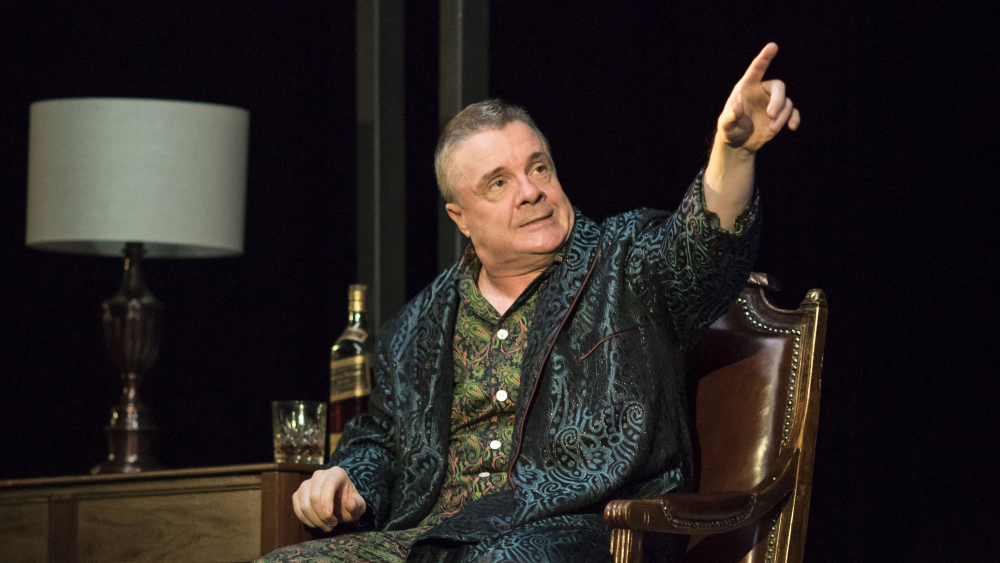by Barbara and Scott Siegel
When the history of contemporary American theater is written, Nathan Lane will surely dominate in any chapters about our actors — and he’ll dominate in the chapter about musical theater actors just as much as he’ll soar above the competition in the chapter on dramatic actors. Simply put, he has proven to be an extraordinarily versatile and vital force on the American stage for four decades. And he may be giving one of his all-time greatest performances (which is saying a lot) right now as Roy Cohn in the Broadway revival of Angels in America.
To some degree, theater critics have taken Nathan Lane’s continuing string of towering performances for granted. It’s not that he hasn’t racked up an extraordinary number of Tony, Drama Desk, and Outer Critics Circle nominations and awards, but rather that he has been so sensational, so often, that we don’t blink an eye at yet another breathtaking performance. Part of that blind eye comes from the nature of his acting; even when he is being subtle and delicately nuanced, he is also usually, at the same time, being bigger-than-life. While some actors are chameleons who morph, almost unseen, from one character to another (i.e. Michael Cerveris), Nathan Lane takes over each of his characters by force. And when he is on stage, he commands attention; he is rarely in a scene but rather he IS the scene. And in live theater, frankly, that is an exciting, thrilling thing to witness.
We well remember seeing Nathan in 1982 in Present Laughter in which he had a supporting role in this Broadway revival that starred George C. Scott — and all we could talk about after seeing the show was Nathan Lane. Of course, the big breakthrough was a decade later, in 1992, when he co-starred on Broadway in the revival of Guys and Dolls as Nathan Detroit (he took the stage name of Nathan from Nathan Detroit – his real name is Joseph Lane – so his success in the musical seems entirely ordained by the God of Theater). And lo and behold, this comic character actor suddenly became a musical theater star, culminating years later when he and Matthew Broderick teamed up to star in The Producers.
As is often the case, the best work with the best, so Nathan’s long associations with Terrence McNally and Stephen Sondheim, have given him not only great characters to play, but he’s been blessed with being in a very high percentage of excellent vehicles, many of which were tailored to his strengths.
But now comes Roy Cohn in Angels in America, a role one would not immediately imagine as a natural fit strictly on a physical basis. Roy Cohn was Jewish and, like Cassius in Julius Caesar, he was a man with a lean and hungry look, while Nathan is of Irish Catholic descent and built more like a fireplug. But Nathan was, nonetheless, perfect for Roy Cohn because they both have a fire in their bellies and a volcanic presence that makes the word “ferocious” far too tame an adjective.
Ron Leibman played the role of Roy Cohn in the original Broadway production and he was terrific. Taking nothing away from Leibman’s now legendary performance, Nathan brings yet another layer of vulnerability to the role because he is, himself, a well-known gay icon in the theater, playing a man who refuses to come to terms with his sexuality. In fact, there is a perfect bit of symmetry and theater justice when Nathan, as Roy Cohn, gets to essentially reference himself when he confides to another character that La Cage Aux Folles is wonderful (Nathan starred in the non-musical film version, titled The Birdcage in 1996).
But the clinching moment, when Nathan owns the character and the play, comes with his speech in Part 1, after his doctor tells him he has AIDs. Roy Cohn insists, in no uncertain terms, that he isn’t gay because homosexuals have no power and he won’t be someone without power. His speech is about as gut-wrenching and character-defining as any speech you will ever hear in the theater. And throughout the play, his mercurial rages and exquisite hatefulness, incredibly coupled with a desperate poignancy, help turn this character into a tragic villain. It is, once again, like so many of Nathan Lane’s performances over the last many decades, a monumental triumph.





















